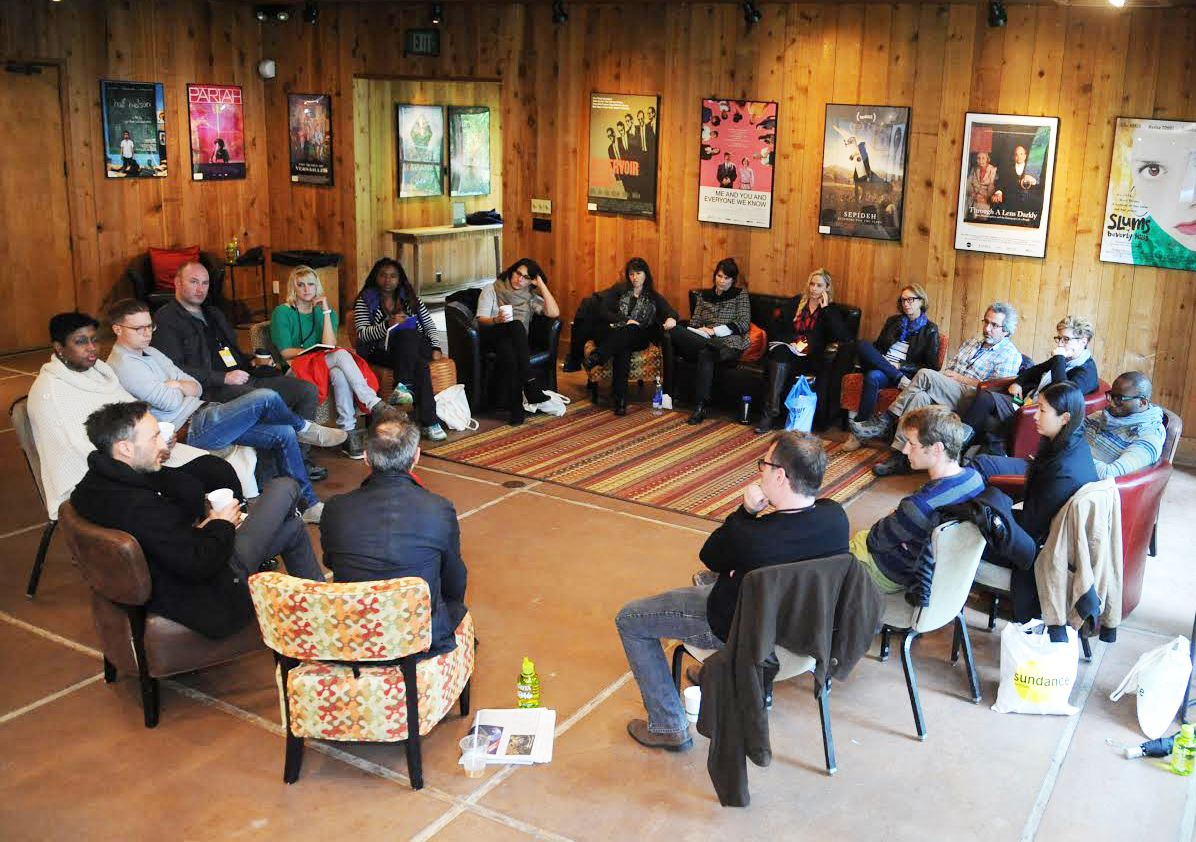Sundance Institute Story Lab sets scene for creative intensity

The first Sundance Institute Episodic Story Lab took place in Utah from Sept. 27-Oct. 2 at the Sundance Resort. It aimed to help emerging writers, both for television and online. Two of the 10 writers selected, Heather Marion and Crystal Liu, are UCLA alumnae.
(Courtesy of Fred Hayes)
By Tony Huang
Oct. 10, 2014 12:19 a.m.
The Sundance Institute gave 10 writers with aims for careers in television the opportunity to have their work pulled apart and put back together in a week-long burst of creative intensity guided by peers and industry professionals.
The inaugural Sundance Institute Episodic Story Lab was held from Sept. 27 through Oct. 2 at the Sundance Resort in Utah. The Episodic Story Lab is the Sundance Institute’s first program designed to assist emerging writers in creating series for television and online. Ten writers were selected, including two UCLA alumnae: 2013 screenwriting graduate Heather Marion and 2002 film graduate Crystal Liu.
The Episodic Story Lab culled its applicants from a recommendation system. Those associated with the Sundance Institute, such as professors, writers and producers, reached out to writers who were nursing ideas for episodic series development. These writers were then given access to the application, which was not open to the public this year but will be for future years.
Marion had been working on a comedy pilot during her years at UCLA that she submitted as a part of her application. The pilot, titled “Bury Me,” tells the story of an estranged daughter who returns home to Nebraska to manage the family funeral home, which is threatening to go under.
Liu, a current staff writer on “American Horror Story,” submitted her comedy pilot “The White Sheep,” which follows an adopted white woman who moves back into her household of overachieving Asian Americans after facing unemployment.
“Our goal is to really help the writer find their place,” said Jennifer Goyne Blake, senior manager of the Episodic Story Lab. “Our mindset has been to cultivate strong (writers) emerging for the changing television industry.”
The week-long program focused mostly on polishing the material that the writers brought with them in a group setting, developing their scripts into viable projects for episodic series.
“We all assembled in writers’ rooms, where we ‘broke story,'” Liu said. “Basically, we took apart each other’s scripts and gave notes on them.”
They also received one-on-one help from creative advisers, including industry professionals and current television showrunners – those who manage a show’s production – such as UCLA screenwriting professor Felicia Henderson. These sessions helped them flesh out the conceptions of their projects by providing detailed notes and comments on the submitted pilots, Marion said.
“The one-on-one sessions were definitely very valuable,” Marion said. “They really helped me ask hard questions about my material.”
Moreover, the lab helped writers come into creative contact with the television industry, setting them up with established showrunners, such as Greg Daniels of “Parks and Recreation,” in order to show writers the practical realities of the craft. Marion had seen Daniels’ run on “Saturday Night Live” and said she was delighted by the opportunity. In general, Liu said the atmosphere of being around other writers and current industry professionals was invigorating and encouraging.
“As a writer, getting across what you’re saying is such a minor miracle,” Liu said. “And to have that with so many talented people is just amazing.”
Marion echoed the sentiment and said she gained a lot from intense contact with her peers, especially through their efforts to help one another’s scripts.
“Just seeing these fantastic writers help each other helped me,” Marion said. “I learned as much from the other writers as I did the mentors.”
Liu said the Episodic Story Lab pushed writers to extract the most important aspects of their stories in order to withstand the intensiveness of the one-on-one sessions as well as the writers’ room discussions.
“The lab had a transformative effect for us,” Liu said. “I definitely came out feeling I’d gained something. I had to dig deeper into my story, make it more specific emotionally.”
The compact time frame and intensified atmosphere of the Episodic Story Lab pushed the writers into new awareness of their abilities, Marion said.
“It felt like an earthquake, but not in a bad way,” Marion said. “We all survived the earthquake and discovered a gold city underneath.”


